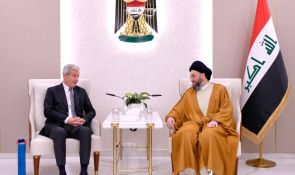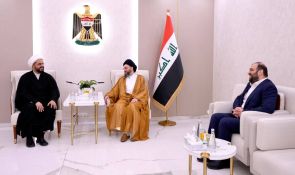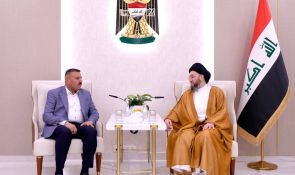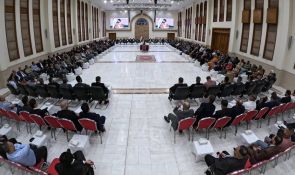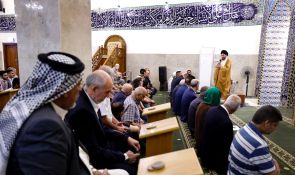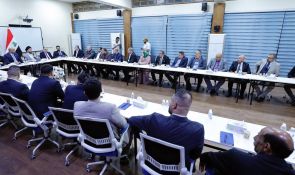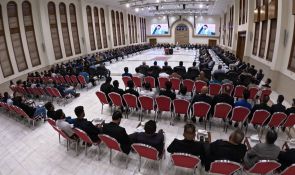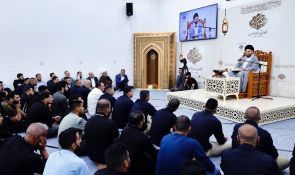Sayyid Ammar al-Hakim: Real Work is What Najaf Needs, not Only Words of Hope... And the Citizen Alliance is Launching "Najaf, Knowledge Capital of Iraq" Project
Sayyid Ammar al-Hakim, head of the Islamic Superior Council of Iraq, stated during a public gathering held by the Citizen Alliance 411 in Najaf on Tuesday, April 9, 2013 that the Citizen Alliance conceived a project for the development of the South, the Middle Euphrates and all the Iraqi provinces and that the Martyr of the Niche movement has integral and connected projects which result in a bigger project intended for the whole nation. Najaf is the core of the Citizen Alliance's project, as he said, promising Najaf citizens that the Marty of the Niche has the right plan that puts this holy province on the right track and announcing the "Najaf, Knowledge Capital of Iraq" project. He also noted that the Citizen Alliance will work with anyone who believes that Najaf deserves to be the knowledge capital of Iraq and takes any proposed ideas in order to develop his and enrich his projects. He stressed that the Citizen of Alliance's projects are not mere dreams or wishes, rather they are well-planned and managed, and that real work is what Najaf needs, not only words of hope.
No one can strip Najaf of its titles, because it is the city of knowledge and scholars
His Eminence maintained that the Martyr of the Niche movement has had the honor to be at the service of Najaf and its people. “While it gave too much with little means and budget, amidst uncertainty in the provincial councils as to the powers and serious security conditions, it feels it has still not paid Najaf citizens their due, and apologizes for any intentional or unintentional obligations he might have failed to fulfill”, he said. “To the eyes of the Martyr of the Niche, Najaf illustrates the religious depth and the intellectual thought, and is the home, the family, the tribe, the city of knowledge and scholars and the enlightened Islamic thought”. That’s why His Eminence announced the "Najaf, Knowledge Capital of Iraq" initiative. “No one can strip Najaf of its titles, because it is the city of knowledge and scholars”, he said, in reference to the “Najaf, Capital of the Islamic Culture” project which was pulled from under its feet, describing Najaf as the queen of provinces and the city of Imamate.
“Najaf, Knowledge Capital of Iraq” project
His Eminence stressed that Najaf is a city of knowledge that produces a large number of scholars. It has the Kufa School from which the Arabic calligraphy emanated. The city of Najaf is the capital of the Imamate and the state of divine justice, and thus it deserves to be the Knowledge Capital of Iraq more than any other city does. Hakim said in his speech that the initiative includes allocating an annual budget for Najaf being the Iraq’s Knowledge Capital at about $ 500 million per year in addition to its basic budget as well as establishing a supreme council represented by Najaf Provincial Council, local government and the religious figures, academics and scholars to run this project. Moreover, a number of international engineering consulting firms will be charged with the urban planning in a way that serves this project.
The initiative also involves establishing the Imam Ali City which would contain research centers specialized in scientific and academic fields, as well as establishing the medical city of Najaf (1,000 beds) housing a Faculty of Medicine and a Faculty of Nursing, in addition to a number of specialized centers that treat all the chronic diseases with the latest state-of-the-art technology, in cooperation and partnership with the international medical centers specialized in this field. The project includes improving the technical and academic skills of the University of Kufa Personnel, for a better representation of the two holy cities of Najaf and Kufa. Furthermore, the project envisions the establishment of the "Student University City" which would accommodate 10 thousand college students from the University of Kufa and from other universities in the province of Najaf, as well as for those coming from other provinces or even from outside Iraq. It also involves the establishment of the "City of Zahid for Religious Rciences," which can accommodate 20 thousand students with their families from the Najaf seminaries; as well as the creation of " Al Jawahiri Center for Studies and Research, Translation and Publishing, " for the translation and publication of books produced by the universities of Najaf and the religious Hawzas in all languages; in addition to setting up the" Global Center for dialogue between religions and sects " so that the Najaf would be the pillar of the national unity and humanitarian dialogue. As far as the service field is concerned, the project includes the development of the municipality of Najaf to match it up to the fact that it is the knowledge capital of Iraq, and the establishment of a neighborhood for the Cultural Missions of the world countries that have representatives in Iraq, as well as the creation of the "Najaf International Book Fair" with high standards measuring up to those of the world's most prestigious book fairs that hold an electronic library as well. Moreover, the project involves the establishment of the "Museum of Najaf," that tells the history of the city from the moment of its creation and the biography of its scientists, men and clans and the restoration of historical sites, homes, and ancient archaeological buildings, as well as providing loans and grants for their owners in order for the city to remain a milestone in the history of the province. As for the agriculture field, the project aims at launching the "Najaf agricultural exhibition" which would be complementary to the "Muthanna agricultural exhibition" for the two provinces are closely linked up; cultivating million acres of the Najaf desert, providing special loans and grants for farmers, equipping them with modern agricultural machinery and thus contributing to the development of the rural infrastructure and services, the development of the agricultural production, and the amelioration of the farmers living conditions. Housing speaking, the project involves the establishment of the "ar-Rihab residential city at low cost" with a capacity of 100 thousand units and which would provide housing for the people of the province, thus ending the problem of the congested and randomly-built areas. It also anticipates the expansion of the Najaf International Airport to adapt it to this holy ancient city of Najaf, and the creation of a railway line between Najaf and Karbala while link it to the national railway network, not to mention the aids and grants that would be provided for the tourism sector and hotels in order to develop their business, and the necessary facilities made available for that purpose.
His Eminence considered the 9th of April as the day on which Allah inflicted His punishment and a new dawn was born, when the statue of the tyrant Saddam Hussein who ruled this country by use of oppression and force was toppled. "That day, the children climbed the statutes of the dictator and stamped them. And Najaf people welcomed the martyr of the niche (P) by shouting "Where is that who fought you… Where is the scoundrel Saddam", he recalled, wondering, "Where are those tyrants? Where are those lords with their strong armies and majestic palaces?" He noted that Mohammad Baqir as-Sadr (P) overthrew their despotism the same day he was assassinated. "Their heads rolled in the mud, while his pure sole went up to heaven; they are now from the past and a mark of disgrace, while as-Sadr remained an emblem of honor worn on the chest", he continued. "The tyrants assassinated the scholars and references of Najaf, and thus assassinated Najaf. However, they don't know that Najaf never dies because it is the city of knowledge. In fact, it was born to last forever until this universe and life cease to exist by the only will of Allah". His Eminence added that the public survived, and tyrants were defeated, and that as the martyr as-Sadr (P) said, "the public is much stronger than tyrants", words also repeated by his companion and right arm, the martyr of the niche, when he came back home to remind the crowds of their martyred as-Sadr, and to which the crowds replied by shouting: "Where is that who fought you?".


